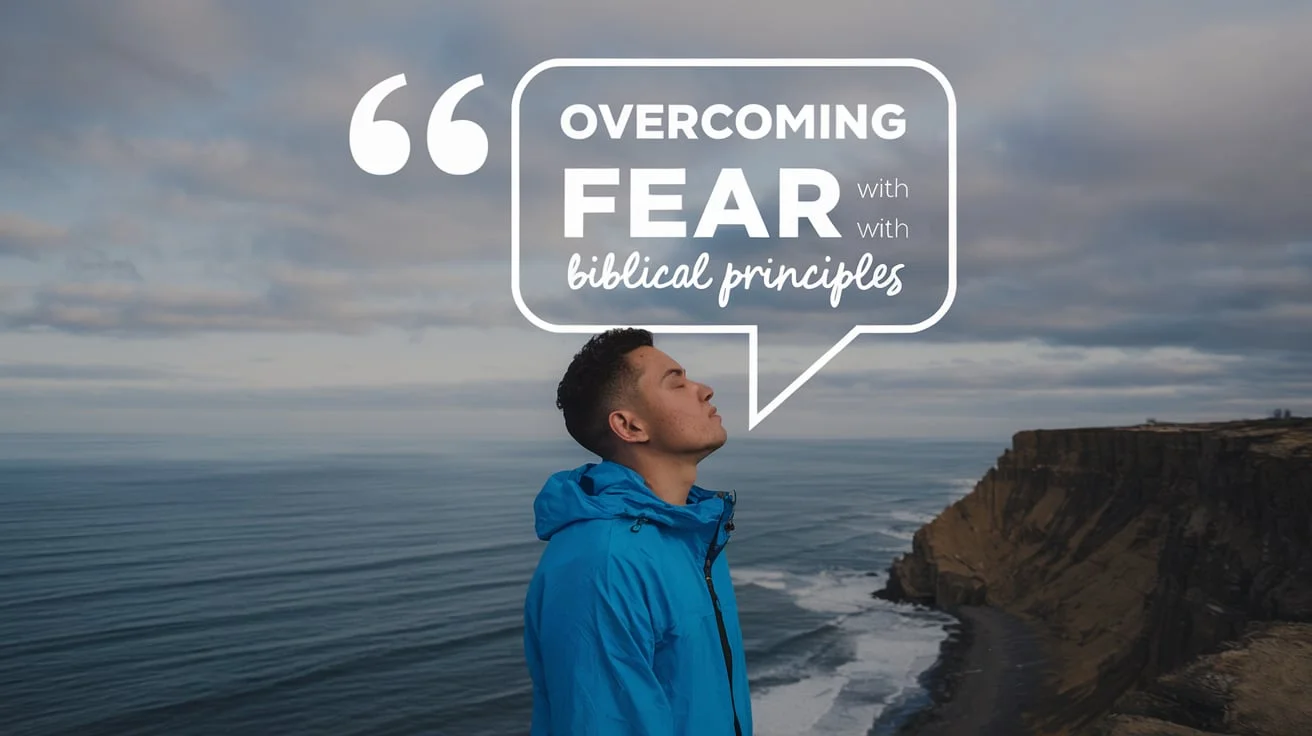Last Updated on October 22, 2024 by Ethan Richards
Fear is a common experience, but the Bible provides a roadmap for overcoming it through faith and trust in God. This guide delves into the biblical approach to fear, offering insights, practical advice, and real-life examples to help believers navigate their fears and cultivate a fearless faith.
Understanding Fear in the Bible
Different Words for Fear in the Bible
The Bible uses various terms to describe fear, each with distinct nuances. Understanding these terms can deepen our appreciation of how fear is addressed in Scripture.
- Yira (יָרֵא): Often translated as “fear” or “reverence,” this term signifies a deep respect or awe, especially towards God. For example, Proverbs 1:7 says, “The fear of the Lord is the beginning of knowledge.”
- Pachad (פָּחַד): This term refers to a more acute sense of terror or dread. In Job 3:25, Job expresses his fear: “For the thing I feared has come upon me.”
- Phobos (φόβος): The Greek word used in the New Testament, denoting both fear and reverence. For instance, Luke 12:5 says, “But I will warn you whom to fear: Fear him who, after he has killed, has authority to cast into hell.”
These terms illustrate that fear can range from profound respect to sheer terror, and understanding this spectrum is crucial for applying biblical principles to overcome fear.
Fear of the Lord in the Bible
Definition and Significance
The fear of the Lord is a recurring theme in Scripture, representing a profound respect and reverence for God. This fear is not about being terrified but about acknowledging God’s greatness and authority.
- Proverbs 1:7: “The fear of the Lord is the beginning of knowledge; fools despise wisdom and instruction.” This verse highlights that true wisdom starts with a respectful acknowledgment of God’s supreme authority.
- Ecclesiastes 12:13: “Fear God and keep his commandments, for this is the whole duty of man.” This passage emphasizes that revering God and obeying His commandments is central to living a fulfilling life.
Scriptural Examples
The fear of the Lord encourages us to live in a way that honors God. For instance, Abraham’s willingness to sacrifice Isaac (Genesis 22:12) demonstrated his deep reverence for God’s command.
Overcoming Fear with Biblical Principles
Trusting in God and His Promises
Trust in God’s promises is a fundamental principle for overcoming fear. The Bible is filled with assurances that God will support and protect us in times of fear.
- Isaiah 41:10: “So do not fear, for I am with you; do not be dismayed, for I am your God. I will strengthen you and help you; I will uphold you with my righteous right hand.”
- Psalm 34:4: “I sought the Lord, and he answered me; he delivered me from all my fears.”
By focusing on these promises, believers can shift their focus from their fears to God’s steadfast support.
Seeking God’s Presence
God’s presence is a powerful antidote to fear. The Bible assures us that God is always with us, providing comfort and strength.
- Psalm 23:4: “Even though I walk through the darkest valley, I will fear no evil, for you are with me; your rod and your staff, they comfort me.”
Practical Steps
- Daily Prayer: Regularly communicate with God through prayer, expressing your fears and seeking His guidance.
- Worship: Engage in worship to experience God’s presence and gain reassurance.
- Meditation: Reflect on Scriptures that emphasize God’s closeness and support.
Relying on God’s Strength
When facing fear, it’s essential to rely on God’s strength rather than our own. The Bible underscores that God’s power is more than sufficient to handle our fears.
- Philippians 4:13: “I can do all things through him who gives me strength.”
- 2 Corinthians 12:9: “But he said to me, ‘My grace is sufficient for you, for my power is made perfect in weakness.’ Therefore I will boast all the more gladly about my weaknesses, so that Christ’s power may rest on me.”
Casting Our Anxieties on Him
Casting our anxieties on God is a clear biblical directive. This involves transferring our worries from ourselves to God, who cares for us deeply.
- 1 Peter 5:7: “Cast all your anxiety on him because he cares for you.”
How to Practice
- Journaling: Write down your anxieties and prayers, then surrender them to God.
- Mindfulness: Use mindfulness techniques to focus on God’s promises instead of your worries.
Renewing Our Minds with God’s Word
Renewing our minds through Scripture is crucial for overcoming fear. The Bible transforms our thinking and provides peace.
- Romans 12:2: “Do not conform to the pattern of this world, but be transformed by the renewing of your mind.”
Recommended Practices
- Daily Bible Reading: Engage with Scripture daily to reinforce your faith.
- Memorization: Memorize verses that speak to overcoming fear.
Fear and Faith in the Bible
Interplay of Fear and Faith
Fear and faith are intertwined in the biblical narrative. While fear is a natural human response, faith in God provides a way to overcome it.
- Daniel 3: Shadrach, Meshach, and Abednego faced the fiery furnace with unwavering faith, demonstrating that faith can conquer even the greatest fears.
Examples of Overcoming Fear with Faith
- David and Goliath: David’s faith in God enabled him to face the giant Goliath, showcasing how faith can overcome seemingly insurmountable fears.
Fear and the Christian Life
Impact of Fear on Christian Living
Fear can affect various aspects of Christian life, including spiritual growth and daily interactions.
- Spiritual Impact: Fear can hinder spiritual development by causing doubt and anxiety.
- Emotional Effects: Prolonged fear can lead to stress and emotional strain.
Biblical Solutions
- Regular Prayer: Cultivating a habit of prayer helps maintain spiritual health and overcome fear.
- Community Support: Engage with fellow believers for encouragement and support.
Strengthening the Christian Life: Overcoming Fear with Faith
Building a Fearless Faith
Cultivating a fearless faith involves actively developing a trust in God that diminishes fear.
- Courageous Living: Embrace challenges with confidence in God’s protection and guidance.
- Community Involvement: Participate in a faith community to strengthen your belief and overcome fear.
Role of Community
- Support Groups: Join groups that provide emotional and spiritual support.
- Accountability Partners: Find someone to share your journey and help you stay focused on faith.
Your next verse awaits—discover powerful Bible truths on our Home Page now or read more articles for deeper insights
Biblical Examples of Overcoming Fear
Notable Figures
Several biblical figures exemplify overcoming fear through faith:
- Joshua: Faced the challenge of leading Israel into the Promised Land with faith (Joshua 1:9).
- Esther: Confronted her fears to save her people, demonstrating bravery and trust in God (Esther 4:16).
Lessons Learned
- Trust God’s Plan: These figures show that trusting in God’s plan can lead to overcoming significant fears and obstacles.
The Role of God’s Love in Overcoming Fear
Love as a Fearless Force
God’s love is a powerful force that drives out fear, providing assurance and comfort.
- 1 John 4:18: “There is no fear in love. But perfect love drives out fear, because fear has to do with punishment. The one who fears is not made perfect in love.”
Experiencing God’s Love
- Personal Reflection: Reflect on experiences where you felt God’s love and how it helped you overcome fear.
- Community Engagement: Participate in church activities that emphasize God’s love and support.
The Consequences of Fear
Detrimental Effects on Life
Fear can have various negative effects:
- Physical: Chronic fear can lead to health issues such as high blood pressure and heart disease.
- Emotional: Persistent fear may cause anxiety and depression.
Biblical Warnings
- 2 Timothy 1:7: “For the Spirit God gave us does not make us timid, but gives us power, love, and self-discipline.” This verse warns against letting fear dominate our lives.
Overcoming Fear with Faith
Practical Applications
Applying faith to overcome fear involves:
- Regular Prayer: Seek God’s guidance and strength through prayer.
- Scripture Meditation: Meditate on verses that reassure and encourage.
Inspirational Stories
- Modern-Day Testimonies: Share stories of individuals who have overcome fear through faith.
The Invitation to Fear Not
Biblical Encouragements
God’s invitation to “fear not” is a recurring theme:
- Isaiah 43:1: “But now, this is what the Lord says—he who created you, Jacob, he who formed you, Israel: ‘Do not fear, for I have redeemed you; I have summoned you by name; you are mine.’”
- Matthew 10:31: “So don’t be afraid; you are worth more than many sparrows.”
Embracing the Invitation
- Prayerful Reflection: Reflect on God’s invitation to live without fear.
- Faith-Based Actions: Take steps to align your actions with your faith and trust in God.
Trusting God to Overcome Fear
Living a Fearless Life
Living without fear involves embracing God’s promises and trust:
- Full Trust: Develop a deep, unwavering trust in God’s care and protection.
- Daily Practices: Incorporate faith-based practices into your daily routine to reinforce trust and diminish fear.
Cultivating a Fearless Faith
Building Long-Term Resilience
Cultivating a fearless faith requires ongoing effort:
- Continuous Learning: Stay engaged with Scripture and faith communities.
- Personal Growth: Focus on personal spiritual growth and resilience.
Ongoing Growth
- Regular Reflection: Reflect on how your faith journey is helping you overcome fear.
- Community Support: Continue participating in faith communities to strengthen your support network.
Conclusion
Overcoming fear with biblical principles involves a deep trust in God, engaging with His promises, and seeking His presence. By focusing on these principles, you can transform fear into a source of strength and courage. Embrace God’s invitation to live without fear and cultivate a fearless faith through practical steps and community support.

James Wilson is a renowned biblical scholar and dream expert, dedicated to exploring the spiritual dimensions of dreams. His in-depth knowledge and compassionate approach provide readers with valuable tools to understand and embrace the divine messages revealed in their dreams.










